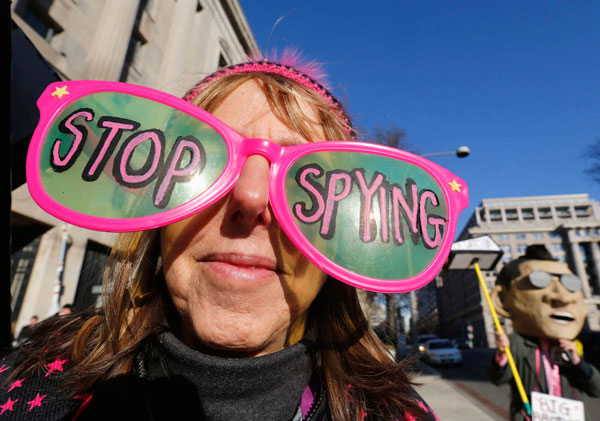ALLIES REASSURED, CONFUSION LINGERS
Obama's announcement of new proposals to reform the surveillance programs is also aimed at foreign audience. Media exposures last year showed that US intelligence agencies have been spying on foreign countries, including the public and leaders of America's European allies. The revelation further stirred up anger and criticism against US surveillance around the world.
In his address, Obama pledged some new restrictions on spying leaders of close allies and some privacy protections for foreign public.
 |
|
The founder of the protest group Code Pink Medea Benjamin wears large sunglasses as she protests against U.S. President Barack Obama and the NSA before his arrival at the Department of Justice in Washington, Jan 17, 2014. [Photo/Agencies] |
"Given the understandable attention that this issue has received, I have made clear to the intelligence community that -- unless there is a compelling national security purpose, we will not monitor the communications of heads of state and government of our close friends and allies," he said.
Leaders of the US allies, as he put, should feel confident that "we are treating them as real partners."
He also vowed that US will only use those intelligence for " legitimate national security purposes," and not for "the purpose of indiscriminately reviewing the emails or phone calls of ordinary people."
However, Obama put it straight that US intelligence agencies will continue gathering information about intentions of foreign governments.
"We will not apologize simply because our services may be more effective," he added.
As the president tried to rebuild trust around the world, it remains unclear whether his general and vague answer could effectively address the concerns of the public around the world that they could be swept up in US surveillance.
Bruce Riedel, a senior fellow and director of Brookings Institution's Intelligence Project, noted that Obama did not make clear who will qualify as "a close ally," which could bring up more confusion.
SURVEILLANCE VITAL, QUESTIONS REMAIN
The president's announcement is aimed to calm the furor and controversy at home and abroad following leaks by Snowden since last June. But he appeared to dedicate the major part of his remarks to reassuring the public -- primarily those in the US -- about the surveillance and applauding the US intelligence establishment.
"What I did not do is stop these programs wholesale -- not only because I felt that they made us more secure, but also because nothing in the initial review, and nothing that I have learned since, indicated that our intelligence community has sought to violate the law or is cavalier about the civil liberties of their fellow citizens," he said.
Benjamin Witts, a senior fellow with Brookings Institution, said the president's speech seemed to be "surprisingly strong endorsement" of the intelligence surveillance itself.
Obama made it clear again that the NSA's surveillance programs remain critical tools for US intelligence agencies to prevent and combat terrorism, and serve the vital national security interests.
The president's emphasis is much more on strengthening transparency and oversight over US intelligence surveillance rather than fundamentally changing the surveillance practices, Riedel noted.
What's more, Riedel pointed out, Obama said multiple attacks had been thwarted due to the intelligence surveillance programs, but he seemed to have failed to provide more details backing up this argument.
|
|
|
|
|
|
|
|
